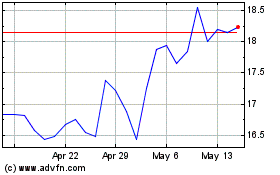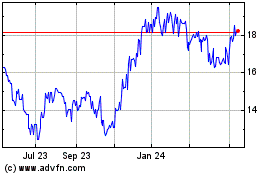By Riva Gold and Akane Otani
U.S. stocks slumped Tuesday, reversing course after their
biggest weekly gain of the year, as crude oil prices tumbled and
government bond yields plumbed record lows.
After initial losses following the U.K. vote to leave the
European Union, global stocks rebounded, with the S&P 500 and
the Dow Jones Industrial Average both climbing more than 3% last
week. Major U.S. indexes pared those gains Tuesday, with some
investors and analysts questioning whether the previous week's
bounceback had been exaggerated.
Shares of commodity-linked companies led the day's losses as
U.S. crude oil, hit by concerns about production increases and the
impact of the U.K. vote, dropped 4.9% to $46.60 a barrel. Some
analysts said the selloff in oil was a sign of fresh concerns about
global economic strength.
The Dow Jones Industrial Average fell 109 points, or 0.6%, to
17841. The S&P 500 declined 0.7%, and the Nasdaq Composite
Index lost 0.8%.
"It definitely feels like the markets woke up on the wrong side
of the bed this morning," said Jason Bloom, director of research
and strategy for commodities and alternatives at PowerShares.
"Crude oil tends to be the epicenter of the global risk off
sentiment."
Oil prices were pressured by data from Friday showing the number
of U.S. rigs drilling for oil increased in the past week, as well
as the strengthening dollar, which makes dollar-traded oil more
expensive for foreign buyers. The WSJ Dollar Index advanced
0.7%.
Energy shares in the S&P 500 fell 1.9%, with shares of
Southwestern Energy declining 10%, and Murphy Oil dropping 7.9%.
The S&P 500 materials sector also declined, giving up 1.9%.
The declines in stocks came amid a rally in government debt, as
the yield on the 10-year U.S. Treasury note settled at a record low
of 1.367%. Yields move inversely to prices.
Financial shares in the S&P 500 slid 1.5% as yields fell and
hopes for an increase in interest rates continued to dim. J.P.
Morgan and Goldman Sachs shares were among the biggest decliners in
the Dow industrials, falling 2.8% and 2.6% respectively.
Financial stocks have suffered among the biggest declines in the
wake of the U.K. vote.
With questions lingering about global growth, the U.K.'s future
relationship with the EU, and politics abroad, U.S. assets like the
dollar and the 10-year Treasury look relatively attractive at the
moment, said Jon Adams, senior investment strategist for BMO Global
Asset Management.
"Uncertainty about policy is clearly driving the markets right
now," Mr. Adams said.
In Europe, the Bank of England warned that the outlook for
stability of the financial system had become "challenging" and took
steps to bolster bank lending.
The British pound slumped to a 31-year-low against the dollar,
recently trading at $1.3047, as analysts warned there was room for
further falls in the U.K. currency. The FTSE 100, whose shares have
benefited from a weaker pound, gained 0.4%. The Stoxx Europe 600
fell 1.7%.
As sterling falls, import-intensive companies that sell to the
U.K. domestic market are likely to suffer, while those primarily
reliant on export markets could benefit, she said.
Meanwhile, London's real-estate sector fell sharply after
M&G Investments, the U.K. fund management arm of Prudential
PLC, halted withdrawals from a U.K. property fund. It was the third
major asset manager to do so since the U.K. voted to leave the
EU.
Some analysts cautioned against becoming overly pessimistic
about the global economy as a result of the Brexit. Investors
shouldn't necessarily "get too concerned about global growth just
because the U.K. is slowing," said Michael Metcalfe, head of macro
strategy at State Street Global Markets.
A more meaningful slowdown from the Brexit vote would likely
require possible political contagion in the eurozone or an
acceleration of concerns about eurozone banks, Mr. Metcalfe
said.
In commodities, gold for July delivery rose 1.5% to $1,356.40 an
ounce, its highest settlement since March 18, 2014.
In Asia, Japan's Nikkei Stock Average fell 0.7%, snapping a
six-session winning streak as the yen climbed against the dollar.
The dollar was recently down 0.9% against the yen at
Yen101.655.
Hong Kong's Hang Seng Index fell 1.5%, while Australian shares
fell 1% after Australia's central bank left its cash rate
unchanged.
The Shanghai Composite Index gained 0.6%, on hopes for
state-owned enterprise reform and after a private gauge showed
activity in China's services sector expanded at a faster rate in
June.
--Nicole Friedman contributed to this story
Write to Riva Gold at riva.gold@wsj.com
(END) Dow Jones Newswires
July 05, 2016 16:27 ET (20:27 GMT)
Copyright (c) 2016 Dow Jones & Company, Inc.
Taylor Wimpey (PK) (USOTC:TWODY)
Historical Stock Chart
From Jun 2024 to Jul 2024

Taylor Wimpey (PK) (USOTC:TWODY)
Historical Stock Chart
From Jul 2023 to Jul 2024
